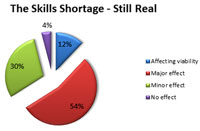Telecoms skills stagnate while demand soars
"Information and communications technology is a pre-condition for socio-economic development and national competitiveness. However, a shortage of key skills is a huge constraint," says Sandra Burmeister, CEO of Landelahni Amrop
"Opportunities abound throughout Africa, despite the challenges of poor infrastructure, disparate regulatory environments and ferocious competition. Spending on ICT infrastructure is expected to total more than US$23 billion a year over the next few years. South Africa and the rest of the continent need to skill up to maximise this opportunity.
"Science and technology minister Naledi Pandor has acknowledged that the telecommunications industry holds promise as the backbone of this country's economic, industrial and innovative advancement. Similarly, the Green Paper for Post School Education and Training released in January states that 'ICT is increasingly becoming a critical ingredient for participation in a globalised world'.
"Seen in this light, it is disturbing that the skills shortage has persisted and the number of new graduates entering the workforce hasn't increased over the past few years. We are rushing into the digital economy at an extraordinary rate, without putting the necessary back-end in place."
In the 2011 ITWeb-JCSE Skills Survey, 66% of companies across a range of industries reported that the ICT skills shortage was having a major effect on their business. Some 34% said that vacancies had increased and it had become harder to recruit staff.
Graduates
The number of computer science and engineering enrolments at universities has increased significantly over the past ten years. However, the graduation rate has dropped to 12,5% over the past few years, compared to the international average of 25%.
From 2005 until 2010, the number of university degrees conferred in computer science and electrical and electronic engineering averaged 1 700 per year. During the same period, an average of 3 130 Technikon diplomas was conferred annually.
"These low numbers mean there is a weak pipeline of ICT skills for the future," says Burmeister. "This is a concern particularly since South Africa stands to lose scarce skilled resources to other African countries as telecommunications projects get underway on the continent."
In 2002, the number of black ICT graduates overtook the number of white graduates, and this trend has accelerated over time, with two-and-a-half times more black than white graduates. Male graduates tend to outnumber female by about two-to-one.
"Taken over ten years, growth in female graduates has been negligible," says Burmeister. "This may partly account for the low number of women in the telecoms sector. Overall, the rate of graduates does not reflect the significant growth of the ICT sector."
This situation is replicated elsewhere in Africa. According to ITWeb, research undertaken by the Kenya ICT Board shows that companies in the ICT sector are having difficulty finding skilled staff. Some 25% of companies said they were not satisfied with the quality of professionals produced by Kenyan universities and colleges, and the number of female graduates remains low.
In-company training
"To compensate for the lack of graduates with the right qualifications entering the workforce, companies have been active in developing in-company training programmes," says Burmeister.
"The telecoms sector has for several years outstripped the all-industry average when it comes to in-company training at all job levels. Training of skilled employees, at 67.7%, outstrips the industry average of 40.4%. However, training of black and female staff lags the all-industry average."
According to the ITWeb-JCSE Survey, companies favour on-site training, followed by self-study. ICT practitioners also prefer skills acquisition through on-the-job experience or mentoring supported by short courses, including vendor specific courses that lead to certification.
"This helps to fill immediate skills gaps, but it is a short-term solution," says Burmeister. "To secure a sustainable base of skills, long-term investment in formal graduate programmes and the implementation of formal career pathing is needed."
Learnerships and internships
It is hard to come by information on employment and on learnerships, since these are not tracked separately in the official statistics. This has been made even more difficult by the recent expansion of the Information Systems, Electronics and Telecommunication Technologies (Isett) Seta to form the Media, Advertising, Information and Communications (MICT) Seta.
"Given the economic importance of IT and telecoms, it is hard to believe that, as a country, we are unable to determine employment numbers in the sector," says Burmeister. "How are we to determine the skills and education requirements that will to allow us to be competitive as a nation, if we are unable to measure the growth in skilled and professional employment in these key areas?"
Future challenges and solutions
The World Economic Forum Global Information Technology Report 2011 ranks South Africa 61st out of 138 countries surveyed in terms of network-readiness for the digital economy. However, the majority of sub-Saharan Africa lags in the bottom half of the list.
The ICT sector has been innovative about recruiting and training to meet short-term needs. If companies are to maximise the opportunities that exist, Burmeister believes a more planned approach is needed to meet future skills demands. "The telecoms sector needs to accelerate skills development across the continent. Companies need to invest in formal graduate programmes and bursaries.
"International exposure and skills exchanges should be part of a broader exposure and retention strategies for managers and skilled professionals are an essential component. Internal skills need to be identified and assessed to determine competency levels and potential for investment in further development. This is the only way to develop a long term, sustainable solution to the telecoms skills crisis."
Landelahni Telecommunications Survey 2012: Research parameters
Main participants in the telecoms sector, including:
- State-owned entities (including Telkom and Sentech)
- JSE-listed companies and large private companies in the fixed line, mobile, regulatory, data communications, international bandwidth and telecoms equipment segments.
- Survey sample: 18 companies - 42 220 employees.























